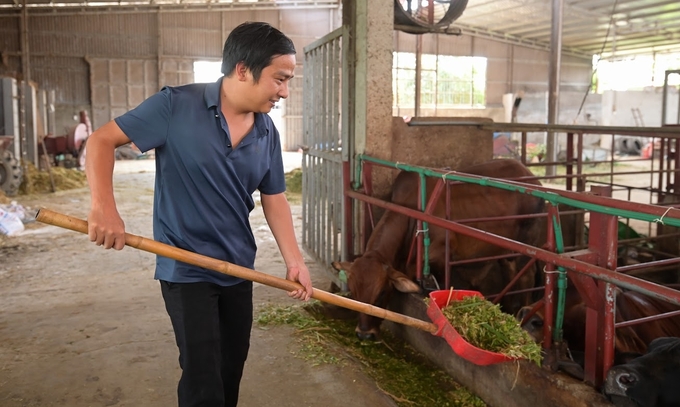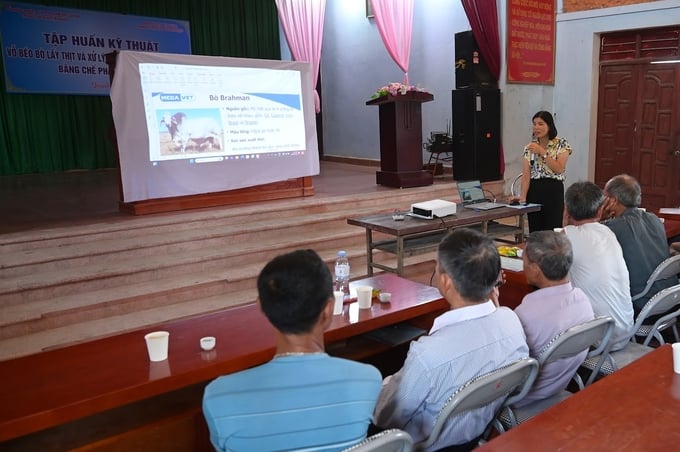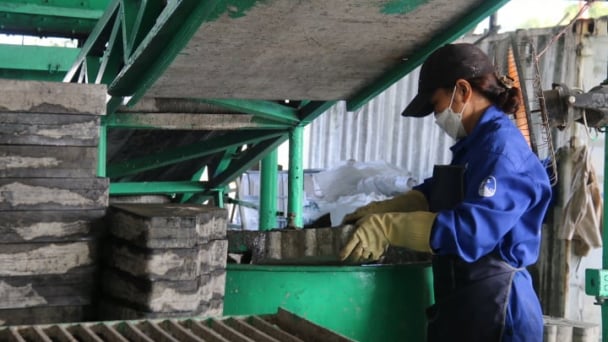May 19, 2025 | 13:45 GMT +7
May 19, 2025 | 13:45 GMT +7
Hotline: 0913.378.918
May 19, 2025 | 13:45 GMT +7
Hotline: 0913.378.918

Kim Van Du supplements green feed for livestock. Photo: Tung Dinh.
These days, Nguyen Xuan Truong (Quynh Son commune, Yen Dung district) is actively preparing supplementary feed for his herd of cows in the fattening stage. Due to the impact of Typhoon No. 3, the 30 cows on the farm have not been guaranteed nutrition for almost a week. Although he has prepared both green feed and silage, Truong still has difficulty managing the farm when Bac Giang province experiences a widespread power outage.
“It seems the herd is stressed and their growth rate is slowing down,” says a farmer in Ngoc Son village, also mentioning that the fattening period for this batch is likely to be 3 - 4 months longer than usual. Two weeks after Typhoon No. 3 made landfall, Truong’s farm has basically stabilized. The barn is clean, airy, and carefully disinfected. He even sprinkles lime powder around the barn.
Not far from Truong's farm, Kim Van Du in Duc Giang commune is also proactively repairing some electrical equipment damaged by flooding. Thanks to early and complete guidance from the government and professional agencies, his farm of more than 200 beef cattle has taken the initiative in responding to the situation. The damage caused by Typhoon No. 3 is mainly to the infrastructure.
The biggest concern for the technician is that some of the cattle in the herd are sick because they are in a flooded barn. This is an area where the waste treatment system is malfunctioning due to power outages, so the barn floor is not washed or cleaned regularly.
“After natural disasters come the epidemics. My facility will focus on vaccinating the entire herd, such as the vaccine against pasteurellosis. The daily diet will be supplemented with amino acids, minerals, and some vitamins to increase the resistance of the buffalo and cows,” Du shared.

Nguyen Thi Gam, Bac Giang Agricultural Extension Center, integrates disease prevention into the training program on fattening cattle. Photo: Tung Dinh.
Preliminary statistics from the Department of Agriculture and Rural Development of Bac Giang province show that in the recent floods, over 170,000 poultry and dozens of livestock were damaged in the province. The department maintains coordination with the People's Committees of districts, towns, cities, relevant departments, branches, sectors and organizations. The number one priority is to proactively implement measures to overcome and minimize damage caused by floods.
In order to ensure effective herd restoration, the Department of Agriculture and Rural Development recommends that farmers focus on vaccination and proactive disease monitoring to detect early and promptly handle sick or suspected animals with dangerous diseases such as African swine fever, avian influenza, foot-and-mouth disease, blue ear disease, etc.
People in the affected areas must not slaughter, buy, or sell sick or dead animals, throw diseased animals into the environment, and must absolutely not graze them in polluted areas. La Thi Chat, Head of the Animal Husbandry and Aquaculture Extension Department (Bac Giang Agricultural Extension Center) adds that people should focus on early disposal of dead animals by burying, burning, or heat treatment to completely kill pathogens. Broad-spectrum disinfectants should be used when cleaning cages.
“If necessary, people can leave the barn empty for a while, particularly in the case of large livestock groups. Households can increase the use of green feed and avoid feed taken from areas that have just been flooded. To supplement nutrition, they should increase the use of starch in the livestock diet, such as complete mixed food, crushed corn, or crushed rice,” said Chat.
Along with that, Chat recommends people have a special care regimen such as supplementing nutritious feed to enhance the recovery process for old and weak livestock and young animals. People should re-herd on the principle of ensuring disease safety and bio-safety, and not re-herd when barns and livestock areas do not meet the above conditions.
Translated by Samuel Pham

(VAN) The German Agricultural Society (DLG) explores the possibility of establishing a mechanization service center in Vietnam’s Mekong Delta to support farmers in accessing and utilizing advanced machinery.

(VAN) On May 16, the Department of Water Resources Management, in collaboration with the Food and Agriculture Organization of the United Nations (FAO), held a signing ceremony for the GEF-8 project document.

(VAN) Food safety, mechanization, vocational training, and market opening are key areas of cooperation expected between the Vietnamese Government and the Federal Republic of Germany.

(VAN) Deputy Minister Nguyen Quoc Tri also expressed his hope that Cuba will soon overcome its current challenges, attain food security, and further expand cooperation with Vietnam.

(VAN) The project contributes to enhancing the resilience of communities vulnerable to the impacts of climate change, with a primary focus on local women.

(VAN) Green materials help save energy and resources. However, after more than 10 years, Vietnam has only developed over 200 green buildings with more than 6 million square meters of floor space.

(VAN) Vietnam - Thailand Business Forum 2025: One plus one on three connects, marking a milestone in the comprehensive strategic partnership between the two nations.